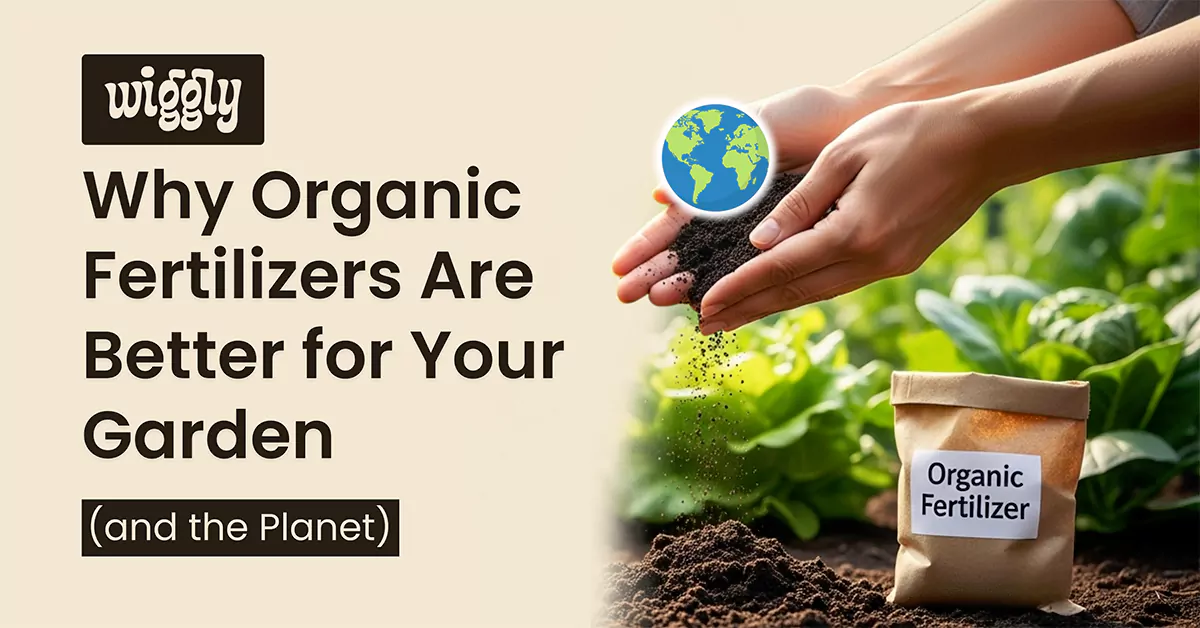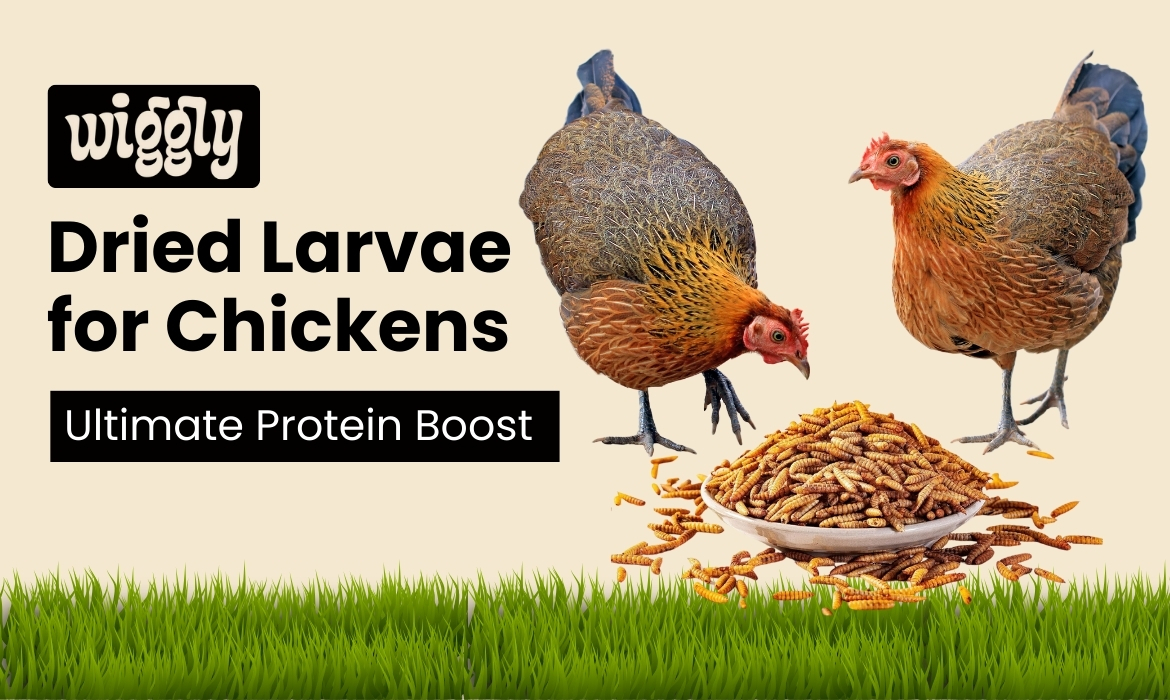Why Organic Fertilizers Are Better for Your Garden (and the Planet)

jorgenjoulu
September 4, 2025 at 9:54 am

jorgenjoulu
Jörgen is the founder of Wiggly, passionate about back-yard chickens, circular economy, and organic agriculture. Jörgen writes on topics like raising healthy chickens, organic fertilizers, eco-friendly gardening, and soil health, insect protein. His mission is to reduce global food waste and promote greener farming practices for a better future.

You have been working hard on your garden- watering, weeding, and pruning, only to find that your plants look weak, your soil feels lifeless, and no matter how much chemical fertilizers you add, the results are not worth it. Frustrating, isn’t it? The truth is, chemical fertilizers may give your plants a quick growth boost, but they tend to leave the soil depleted, and your garden dependent on more artificial inputs. That’s where organic fertilizers step in to save your plants, as well as the planet.
If you have ever wondered whether switching to organic garden fertilizers is worth it, let’s dig a little deeper (pun intended!) into why natural fertilizers are a game-changer for your garden as well as the environment.
Chemical Fertilizers vs. Organic Fertilizers: What’s the Difference?
Chemical fertilizers are more like junk food for your plants- they are fast and flashy, but not exactly healthy in the long run. As these fertilizers are usually made from synthetic compounds like ammonium, nitrate, or urea, they do deliver nutrients quickly, but once those nutrients are used up, your plants are left craving more, while the soil gets more depleted each time.
On the other hand, chemical-free fertilizers are like wholesome home-cooked meals. They are made from natural materials like compost, manure, bone meal, or even black solider fly larvae poop. Instead of just feeding plants temporarily, these fertilizers enrich the soil itself and make it healthier and more resilient over time.
Why Use Organic Fertilizers?
In case you are wondering why organic compost is better for your garden, here are some benefits of organic fertilizer to help you get started:
- Healthier Soil = Healthier Plants
Most gardeners don’t understand the fact that the soil we walk on is alive. It is home to billions of microorganisms, fungi, and bacteria that work together to recycle nutrients and keep plants thriving. Chemical fertilizers can disrupt this delicate ecosystem, but natural plant food helps nourish it.
In fact, did you know that just one teaspoon of healthy soil can contain up to a billion bacteria and several yards of fungal threads? (Source) When you decide to use organic fertilizers, you are encouraging this invisible army of microorganisms to keep your soil fertile, naturally.
- Slow and Steady Nutrition
Unlike chemical fertilizers that “dump” nutrients quickly, organic fertilizers release nutrients slowly and steadily, which means your plants get a continuous supply of what they need, without the risk of nutrient burn or sudden die-back. We would say it’s the eco-friendly gardening equivalent of a balanced diet rather than a sugar rush.
- Better Water Retention
Have you ever noticed how chemical fertilizers can make soil hard and crusty? This happens because they strip the soil of its organic matter. However, organic fertilizers improve garden soil naturally and enhance the soil texture, so the soil can hold water. This means your plants stay hydrated longer, and you don’t have to water it as frequently, which is especially useful in hot summers.
- Long-Term Results
Chemical fertilizers might show results faster, but they often lead to dependency. Over time, soil treated only with chemicals becomes depleted and compacted. Meanwhile, organic fertilizers build long-term soil fertility, so it would be like investing in your garden’s future instead of just chasing short-term results.
Why are Organic Fertilizers Better for the Planet?
Globally, over 100 million tons of synthetic fertilizers are applied each year, which contributes significantly to water and air pollution. (Source) Here’s why organic fertilizers work incredibly well for sustainable gardening and the planet:
- Lower Pollution Risk
Chemical fertilizers often run off into nearby streams and rivers, leading to water pollution, algae blooms, and harm to aquatic life. According to the Environmental Protection Agency (EPA), nutrient pollution from fertilizers is one of America’s most widespread, costly, and challenging environmental problems.
Organic fertilizers, being natural, are far less likely to cause this kind of damage and maintain your organic soil health. They break down slowly and stay where your plants need them, right in the soil.
- Reduced Carbon Footprint
Manufacturing chemical fertilizers requires a lot of energy, often from fossil fuels, which contributes to greenhouse gas emissions. Organic fertilizers, by contrast, are often made from recycled natural materials, reducing waste and lowering carbon emissions. Composting kitchen scraps, for instance, not only creates a free organic fertilizer but also prevents food waste from ending up in landfills.
- Biodiversity Boost
When your soil thrives, so does the world around it. Birds, bees, earthworms, and beneficial insects all benefit from the balanced ecosystem that organic fertilizers support. Think of your garden as a tiny piece of the planet; when you nurture it naturally with organic farming methods, you are also giving back to the bigger picture.
Final Thoughts on Organic Fertilisers
Switching to organic fertilizers isn’t just about growing prettier flowers or tastier tomatoes; it’s about creating a sustainable cycle that benefits both your garden and the Earth. By choosing organic, you’re not only giving your plants the nutrients they need but also restoring balance to the soil, conserving water, reducing pollution, and protecting biodiversity.
So the next time you stand in the garden aisle staring at bags of chemical fertilizer, ask yourself: do I want a quick fix, or do I want a thriving garden that keeps giving year after year? The answer, for your garden and the planet, is clear- organic wins every time.
Looking for the best organic fertilizer for garden? Try the BSF organic fertilizer from Wiggly Feed today, and feel the difference!




